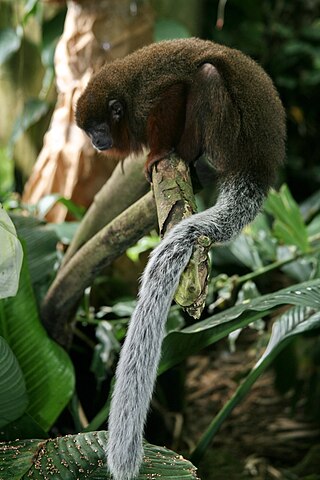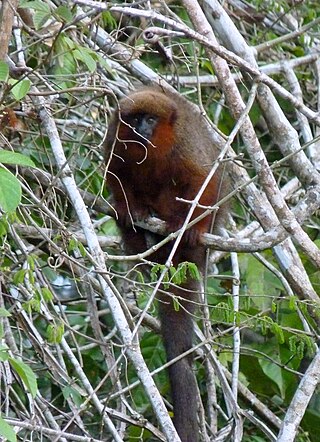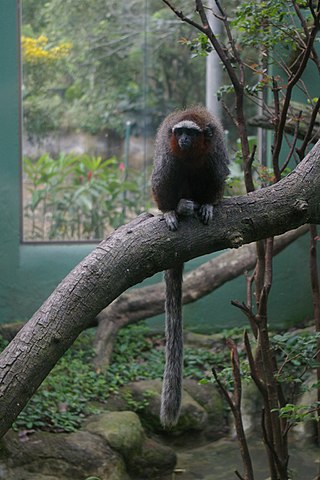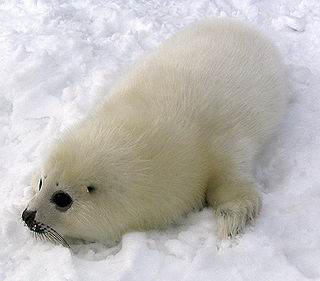
The Pitheciidae are one of the five families of New World monkeys now recognised. Formerly, they were included in the family Atelidae. The family includes the titis, saki monkeys and uakaris. Most species are native to the Amazon region of Brazil, with some being found from Colombia in the north to Bolivia in the south.

The titis, or titi monkeys, are New World monkeys of the subfamily Callicebinae, which contains three extant genera: Cheracebus, Callicebus, and Plecturocebus. This subfamily also contains the extinct genera Miocallicebus, Homunculus, and Carlocebus.

The Madidi titi monkey, also known as the GoldenPalace.com monkey or the golden palace monkey, is a titi, a kind of New World monkey, discovered in western Bolivia's Madidi National Park in 2004. Its scientific name is Plecturocebus aureipalatii, the specific epithet meaning "of the Golden Palace", in reference to GoldenPalace.com, an online casino which paid US$650,000 to have the species named after them, with benefits going toward the nonprofit organization that maintains the park where the titi was discovered.

A white coat, also known as a laboratory coat or lab coat, is a knee-length overcoat or smock worn by professionals in the medical field or by those involved in laboratory work. The coat protects their street clothes and also serves as a simple uniform. The garment is made from white or light-colored cotton, linen, or cotton polyester blend, allowing it to be washed at high temperature and making it easy to see if it is clean.

The collared titi monkey is a species of titi, a type of New World monkey. It is endemic to northern Brazil.

The Atlantic titi monkey or masked titi is a species of titi, a type of New World monkey, endemic to Brazil.

The white-coated titi monkey is a species of titi monkey, a type of New World monkey, from South America. It is found in Bolivia, Brazil, and Paraguay.

The white-eared titi monkey also known as the Bolivian titi or Bolivian gray titi, is a species of titi monkey, a type of New World monkey, from eastern Bolivia and an area of western Brazil. The species has a range that extends east from the Manique River in Beni Department, Bolivia to southern Rondônia in Brazil. The southern end of its range includes forests around the city of Santa Cruz de la Sierra.

The Colombian black-handed titi monkey is a species of titi, a type of New World monkey, endemic to Colombia. It was originally described in the genus Callicebus in 1963.

The ornate titi monkey is a species of titi monkey and is the smallest member of the family Pitheciidae, which also includes uakaris and saki monkeys. As it is a member of this family, it is classified as a type of New World monkey. It is endemic to eastern Colombia, and the only member of the Plecturocebus moloch group to occur north of the Rios Amazonas/Solimes/Napo axis, living at least 350 km away from the closest other member, the white-tailed titi, which lives in the south of Colombia. It was once classified as the same species as the white-tailed titi, but is now officially recognized as its own species. The ornate titi is also terrestrial.

A whitecoat is a newborn harp or grey seal with soft, white fur.

Intern Academy is a 2004 Canadian comedy film written and directed by Dave Thomas. It has several alternative titles including working titles An Intern's Diary, Whitecoats and Interns. In Canada, its English title is Intern Academy, while its French title is Médecin en herbe. The US DVD title is White Coats. Its Italian title is "L'ospedale piu' sexy del mondo," literally "The Sexiest Hospital in the World".
Titi is a New World monkey in the genus Callicebus.

The uniforms of the United States Air Force are the standardized military uniforms worn by airmen of the United States Air Force to distinguish themselves from the other services.

nib Group is an Australian health care fund. It was established in the NSW Hunter Region in 1952 to provide health insurance for workers at the BHP Steelworks, and has since grown into a national and international operation. As of 2017, nib held an 8.3% share of the Australian private health cover market.

The Caquetá titi monkey, also known as the red-bearded titi or the bushy-bearded titi, is a species of titi monkey endemic to Colombia found in the Department of Caquetá region. Taxonomically, it is a member of the "Callicebus cupreus group", following Shunsuke Kobayashi's Callicebus grouping. It was first described by Thomas Defler, Marta Bueno and Javier Garcia in 2010. It is highly endangered due to habitat fragmentation and a small population.
Whitecoat Health Service Directory, commonly referred to as Whitecoat, is an online directory of healthcare professionals. It was launched in Australia in 2013 and New Zealand in 2018. The service allows consumers to rate their experience of a healthcare provider and read other users’ recommendations and reviews. By 2016, Whitecoat was the largest website of its kind in Australia. Whitecoat has drawn significant criticism from professional medical bodies.

Plecturocebus is one of three genera of titi monkeys.
"Tití Me Preguntó" is a song by Puerto Rican rapper Bad Bunny. The song samples "No Te Puedo Olvidar" by the Dominican musician Anthony "El Mayimbe" Santos and can be heard throughout the song. It was originally released on May 6, 2022, by Rimas Entertainment as the fourth track of Bad Bunny's fifth studio album Un Verano Sin Ti (2022) before being released on June 1, 2022, as the third single from the album. The song was written by Bunny with MAG handling the production. The genre-fusing shapeshifting song combines elements of dembow, latin trap, psychedelia, and bachata.














